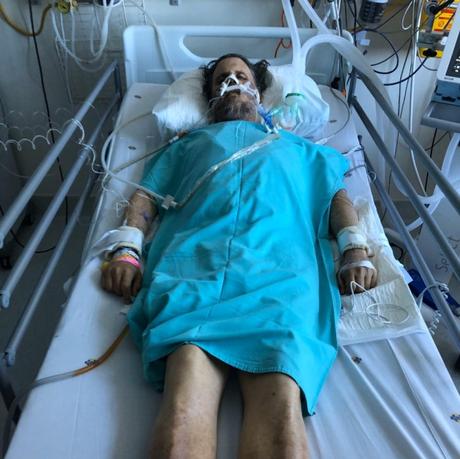
So one morning in early December, I woke up in ICU.
To be more accurate, I didn’t “wake up” so much as become aware of my surroundings. The bright lights; the dozen or so tubes snaking out of various parts of me; the wires to the monitors and the deeply uncomfortable feeding pipe extending from my nose. My partner was also there – concern and exhaustion painting her features in thick layers.
Apparently, I’d been awake and responsive the day before and the day before that, but I have no memory of that. Similarly, I have no memory of my friends visiting me or any of the interactions I had with them. I was essentially a sophisticated automaton, if you will. For practical purposes, this was the first time I was myself again (in broad terms and putting aside the philosophical vagaries of how one would go about defining selfhood).
Before my emergence from the fog of discontinuity, I’d been unconscious for number of days and prior to that, I’d been placed in a medically-induced coma while the medical team laboured to drag me back from the precipice.
Perhaps a bit of context is called for here: I found out in late November that I have genetic haemochromatosis. For those who don’t feel like asking The Google what this spelling bee nightmare is all about, allow me to elucidate. It’s a disorder that disrupts my body’s ability to regulate its iron uptake. The consequence of this is an excess of iron which gets dumped and stored in various organs like the pancreas, liver, and heart, with no simple way to remove it.
The condition has been misdiagnosed for years, so my ferritin levels are off the charts. The accumulated iron is what punched my pancreas in the face and gave me Type 2 diabetes (not too many cupcakes for lunch). It also dragged my liver into a dark alley and kicked it in the proverbial testicles so hard that according to my gastroenterologist, I have “severely decompensated liver function”, or “cirrhosis” in the parlance of normal people.
Both conditions are somewhat ironic (hah!) because (a) I follow a healthy diet and lifestyle and (2) I don’t drink alcohol. On the other hand, I would probably have dropped dead years ago if I was an alcoholic butterball.
The cirrhosis interferes with my liver’s filtration mechanism and this causes abdominal pressure to build up to an extent where the blood seeks alternative escape routes – the most common being via the gastro-intestinal tract. This causes the growth of clusters of distended blood vessels called “varices” in the oesophagus. These clusters are particularly dangerous little bastards, because if any of them pop, you can easily bleed to death if you aren’t near an emergency room. This is called “exploding gizzard syndrome” (not really).
Anyway, I was admitted to hospital as a matter of urgency to have my varices attended to via a procedure called “banding”. The intention was to subsequently start treatment to reduce my ferritin to normal levels and hopefully restore some liver function.
The procedure was apparently successful, albeit extremely painful. Unfortunately, I developed an infection and several days later, one of the varices ruptured and I started vomiting blood. So. Much. Blood. We’re talking ‘Carrie’ volumes here. My partner rushed me to the emergency room while I called ahead to fill my doctor in. When we arrived, we knew I was headed downhill fast, because the first thing the doctor said was, “We’re in trouble here”. He had that “Oh no, I’m going to have to call the family look”, which is never a good sign. I was hooked up to an array of tubes and equipment and wheeled off to ICU. That was the last thing I remember before I finally crawled out of the near side of the Styx a week later. I’d obviously left my wallet in my other pants.
When I was unconscious, I was transferred to the University of Cape Town Private Academic Hospital, where I received the best care a person could hope for. The medical staff were brilliant; the nursing staff were tirelessly vigilant; and my partner was unbelievably strong. Even though she had to deal with the shock and terror, she still found time to take care of everything – admin; finances; and keeping everyone up to speed on my condition. Most of all, she was there every day, all day, until I was discharged. She was as important to my recovery as the medical team.
They managed to coax me back from the threshold of Death’s door and prod me to the hospital main entrance within two weeks, which left many people with their ghasts completely flabbered. After I was discharged and my friends came to visit, one of them voiced what everyone was thinking. He said, “Dude, we genuinely thought you were going to die”.
I didn’t.
And I’m glad to be alive.
Also, I’m engaged, so I no longer have a partner, but a fiancée.
Life is good.

